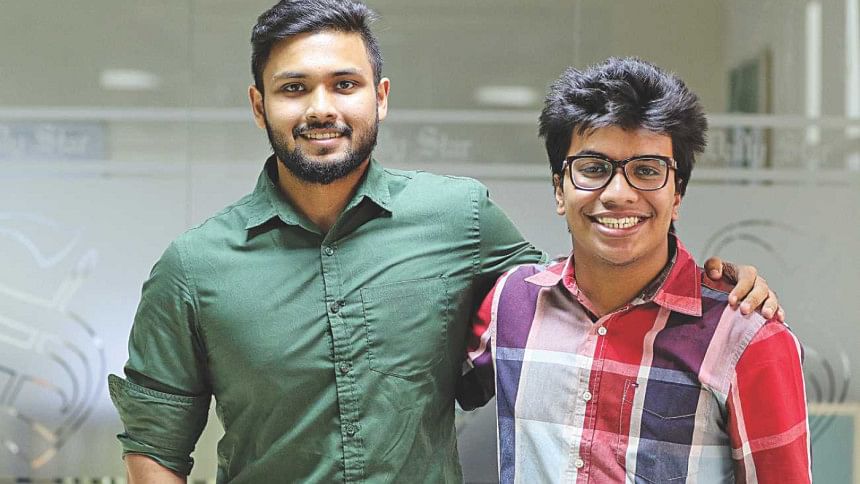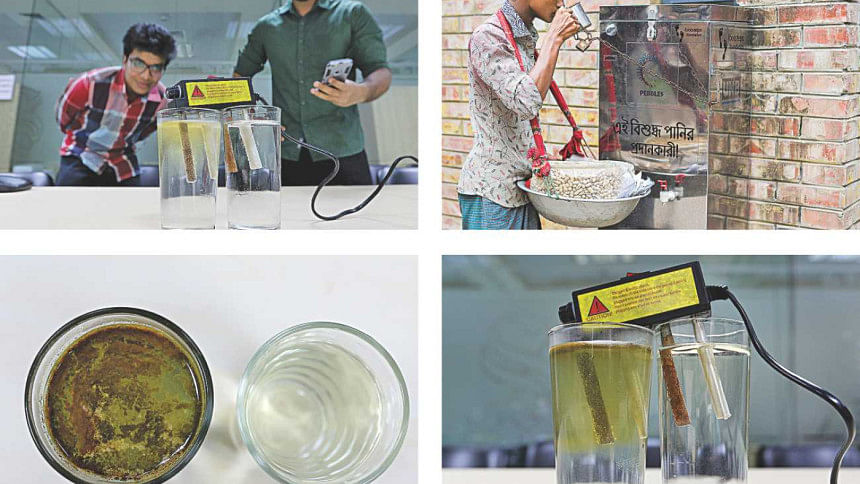'Footsteps' towards a Better Tomorrow

Access to clean water is not only a fundamental human need, but also a basic human right. Have you ever contemplated on what kind of water we are being provided with at the safety of our homes, or even through the presumably 'safe' brands of bottled drinking water that we purchase?
'Footsteps' is a development-based social enterprise which looks to improve social conditions in Bangladesh. Their initiative 'Project Trishna' provides clean drinking water to the masses on the streets for free. “Reverse Osmosis is the best water purifying technology out there today,” says Shah Rafayat Chowdhury, President and Co-founder at Footsteps. “However, it is also very expensive. What we tried to do is come up with an economical solution for it, and then introduce it on a larger scale. That is why we are promoting our own RO technology.” Rafayat is currently a student of Environmental Economics at Pennsylvania State University in the USA. "We officially began in December 2013, with out first project, Heartwarming Winter," he adds. "And although we are referred to as Footsteps, the official name is Footsteps Foundation."
The project currently has 55 RO devices at different points in the city. They are providing over 4000 liters of clean drinking water every day. “You won't believe how unsanitary the water we receive in our households can be. In fact, we can show it to you,” adds Mohammad Taqi Yasir, the Vice President of the organisation. The duo had brought a pocket-sized electrolysis machine that they use to test the impurities in water.

The results were astounding. As shown in the pictures, the water from the tap shows an alarming amount of iron after the electrolysis. Even the water we extracted from the purifier showed slight tinges of yellow after just a minute of the process. “This is not surprising to us at all,” smiles Rafayat, “You will be surprised to know that we have found impurities in many of our renowned brands of bottled drinking water as well. We really have to be careful about what we are consuming.” The most alarming aspect of this discovery is the fact that about 60 percent of our population still drinks tap water directly. The project aims to provide about 80,000 liters of clean drinking water in the very near future.
Rafayat's idea for Project Trishna has been selected for the Global Youth Summit this year. The summit is organised by Global Changemakers, a Swiss NGO. They select 60 young 'changemakers', -- young people with innovative projects that can contribute to making a positive impact on the society. When asked about how the idea got selected, Rafayat told us that anyone can apply through their application form. After he wrote about Project Trishna, he got called for an interview with the organisation. “I was in New York when I got called up. I shared my idea with the co-founder and we talked about how this project could help each of our communities. That is basically how it got selected for the summit”.
Besides Project Trishna, Footsteps is constantly working round the year with different projects which aim towards helping the underprivileged and making the country a better place. Previously, the organisation had conducted a project called 'WECAn', one which aimed to encourage private companies to provide trashcans around their premises. It was highly successful, as the companies could improve their public image while at the same time, help the environment. 'A Heartwarming Winter' attempts to collect donations in order to provide warm winter clothes for the needy around the country. The organisation follows the 17 Sustainable Development Goals set by the UN, of which they have addressed 17 community issues in Bangladesh: Access to Clean Drinking Water, Public Health, Waste Management, Poverty Eradication, Public Awareness, Female Empowerment and Climate Change Adaptation.
“We currently have 30 active members, they are permanent members of our organisation. Besides them, a thousand dedicated volunteers are working selflessly throughout the year,” says Taqi. The organisation also creates documentaries in order to raise awareness about impending issues. 'Abar Ashbo Phire' is one that has been widely praised and has become an exemplary 'hit' among young doers and activists in the country. “All that we do is for the love of our country. We have a lot of problems, but I believe we have the talent and resources to solve them if we just stand united,” adds Rafayat, who plans to come back to the country after he is done with his education and use the experience he gained for the betterment of the community.
It is safe to say that one can make Bangladesh a much better place for the future generations, if only one would follow the positive and inspiring footsteps of real changemakers.

 For all latest news, follow The Daily Star's Google News channel.
For all latest news, follow The Daily Star's Google News channel. 



Comments